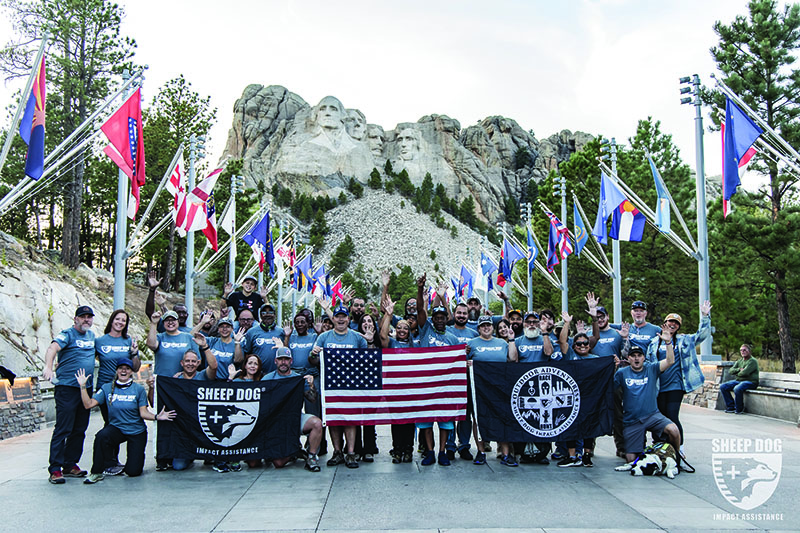
When Sheepdogs Come Home: Veterans Helping Veterans Heal and Thrive
By: Abigail GrysbanPosted on May 15, 2025
Executive Editor’s note: June 27 is PTSD awareness day. We bring you this article to reinforce the importance of speaking openly about PTSD and other mental health issues. For more information about resources available to veterans, visit: https://www.mca-marines
.org/resource/resources-for-veteran
-marines/
The transition back into civilian life can pose significant mental, emotional, and physical challenges for our nation’s heroes. Coming home after a tour of duty can mean losing one’s sense of purpose and identity; cycling through feelings of guilt, anger and depression; experiencing flashbacks of traumatic events and—sometimes worst of all—losing the close-knit community once shared with comrades. Drug or alcohol addiction is common, and relationships with family and friends at home suffer as a result. And while it’s a common stereotype that veterans often experience post-traumatic stress disorder, support isn’t nearly as abundant as the diagnoses.
These struggles take a toll. The National Veteran Suicide Prevention Annual Report estimates that over 6,000 veterans die by suicide annually—nearly 20 per day. Our country loses more warriors each year to suicide than in the field. These sobering statistics highlight a painful point: our nation’s “sheep dogs” deserve better.
Enter Sheep Dog Impact Assistance (SDIA), a nonprofit organization that helps veterans and first responders find strength, purpose, community and healing after trauma. “Our whole purpose is to save lives,” said Lance Nutt, CEO and Founder of SDIA. After all, a Sheep Dog doesn’t stop being one when they finish their tour of duty. It’s much more than something they do; it’s something they are.
Lieutenant Colonel Dave Grossman USA (Ret), author of “On Combat,” explains, on the SDIA website, “After the attacks on September 11, 2001, most of the sheep, that is, most citizens in America said, ‘Thank God I wasn’t on one of those planes.’ The Sheep Dogs, the warriors, said, ‘Dear God, I wish I could have been on one of those planes. Maybe I could have made a difference.’”
Lance Nutt radiates an undeniable passion for veterans, their struggles and their potential. After all, he is one of them.
His father was a longtime Marine Corps aviator, and his family moved around frequently during his childhood. He grew up living and breathing the Marine Corps, so when it came time to choose a path for himself, becoming a Marine was a natural choice. In a profound moment for parent and child, Nutt’s own father swore him into the Marine Corps in 1988.
Nutt was soon deployed to the Persian Gulf and served during Operations Desert Shield and Desert Storm. After returning to the States and completing college, he spent several years as a Marine recruiter. He took a break from the service to accept a civilian position in corporate sales management, but the Marine Corps was never far from his mind. Nutt knew he wanted to make a difference with his life beyond profit meetings and sales targets, so he quit sales and rejoined the Marines in 2003.
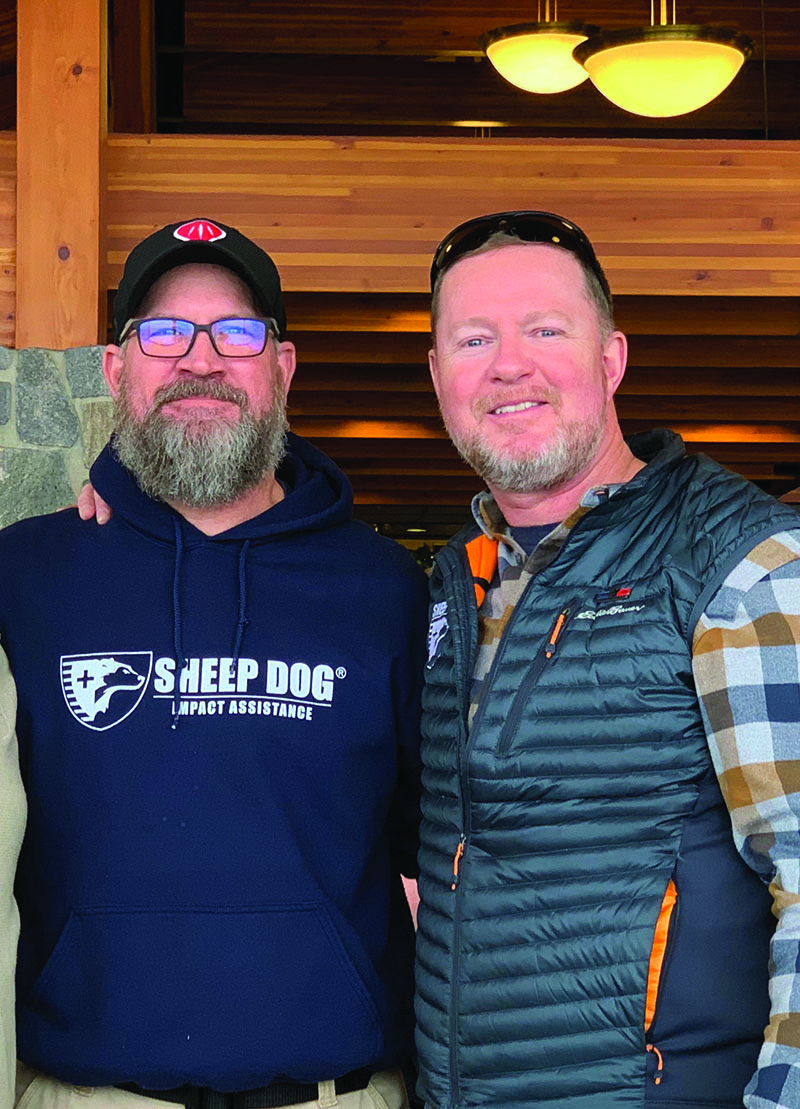
It was 2005 when Nutt formed the idea for Sheep Dog Impact Assistance. Hurricane Katrina hit New Orleans while Nutt was stateside, so he organized an independent relief trip to help those affected by the disaster. The purpose and camaraderie he experienced during this trip made him realize this was a perfect way for Sheep Dogs to “get off the couch” and find meaning and community in serving others.
In 2010 he officially launched Sheep Dog Impact Assistance, and their disaster response missions quickly began to attract interest from veterans around the country. He led groups of comrades to various states and cities; whenever a natural disaster showed up, so did they.
Eventually, however, Nutt realized that while emergencies were a great opportunity for service, simply sitting around waiting for another disaster to strike wasn’t a healthy mindset—for himself or for the veterans he rallied for the missions. So, he added another program called Outdoor Adventures. In this arm of SDIA, veterans and first responders gathered together to participate in activities such as hunting, fishing, snowmobiling, hiking, skydiving and more. These adventures created a powerful experience for Sheep Dogs, who were connecting with each other and being challenged in new ways, both physically and mentally.
Nutt retired from the Marine Corps in 2018 with 30 years of service under his belt and the title of Sergeant Major of the 23rd Marine Regiment. By this time, SDIA had been active for eight years. After his Marine Corps retirement, however, he realized his organization could—and should—do more. SDIA was filling an important niche—it was providing an outlet for veterans to “get off the couch” and experience purpose and community again. But those same people were still struggling profoundly when they went back home. The emotions, the traumas, the pain and the memories were all still there.
Nutt vividly remembered how difficult military retirement was for his dad—the questioning, the anger, the relationship crises—and now he was experiencing similar struggles himself. He needed a solution that wasn’t just a temporary fix but a new way of operating that would help him and those he served truly heal and move forward in life.
During this time, Nutt connected with John Boozman, one of his U.S. senators from Arkansas. Boozman told Nutt about an organization called Boulder Crest Foundation and a program they were running in Arizona and Virginia called Warrior PATHH. He suggested that Nutt check out the program with the hope of bringing it to Arkansas for their state’s military veterans and families. So, Nutt flew to Arizona to attend the program. What he learned there would be nothing short of life-changing.
Warrior PATHH, an acronym for Progressive & Alternative Training for Helping Heroes, is a transformational mental wellness program created by Boulder Crest Foundation, and it involves a seven-day, on-site intensive course followed by three months of wellness training, support and mentorship by peers who know firsthand the challenges veterans face. During this program, participants learn about the science of post-traumatic growth, empowering them to find purpose and hope after trauma. Participants aren’t just given “tools” or “tips”; Warrior PATHH helps veterans and first responders form new habits, transform their struggles into strength and learn how to thrive again.
“I was going to look into it for [SDIA],” Nutt said, “but [eventually] I realized it was helping me, too.” He learned that there is always more healing to be had, even—or perhaps especially—for a lifetime Marine such as himself. He finished the program inspired to incorporate its principles into his organization.
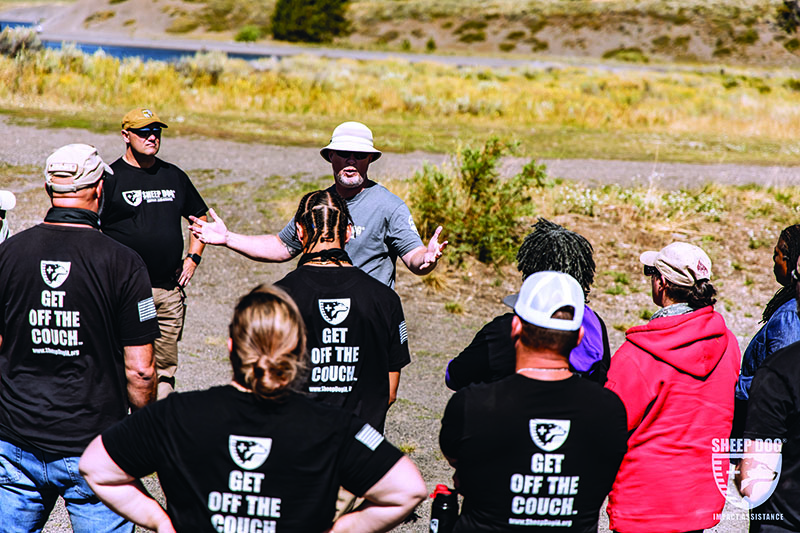
Chris Jackson would be the next one to experience the transformative benefits of Warrior PATHH. Chris describes his transition out of the Marine Corps as a profoundly lonely season of life. After 27 years of service, including several tours in Iraq, the retired Marine was exhausted and directionless. Like many before him, he turned to alcohol for solace. At first, it was just a beer here and there, but eventually, it turned into more until he was drinking just to numb the pain. “I was in fight or flight mode all the time,” he said. He was worried and confused. Jackson didn’t know what was happening to him, and he didn’t know where to turn. He often prayed alone, through tears, for help and answers.
He had been drinking one day, as had become his habit, when his daughter asked him a gut-wrenching question. “Why do you drink so much?” It was an acute flash of realization. “That was the moment,” Jackson said, “that I knew something needed to change.”
A miracle meeting was the turning point that allowed Jackson to step into that change. During his early years in the Marine Corps, he served with and befriended Nutt. They hadn’t kept in touch, but one day Jackson decided to attend a Carry the Load event in Dallas, Texas. Strolling by the SDIA booth, Jackson couldn’t believe his eyes when he saw his old comrade behind the table.
As the two Marines caught up, Nutt told Jackson about his work with Sheep Dogs and encouraged him to come check it out. With nothing to lose, Jackson signed up for a disaster response mission with SDIA. Those few days of service and community with other veterans sparked something inside him, so next he joined an SDIA Outdoor Adventure. These two events began to shift Jackson’s mindset. He realized how much he still struggled to find direction and purpose in his daily life. Eventually, he decided to follow Nutt’s footsteps into the Warrior PATHH program at Boulder Crest Foundation, and that’s when the true transformation began.
“[The program] helped me build mental fitness,” Jackson said. “They showed me how to give myself grace, that there were layers of stress from everything, which caused me to react. Now, I can respond to stress instead of just reacting. I’m able to be others-centered again like I was in the Marines.”
Nearly tearing up, Jackson revealed that his oldest daughter (the same one who asked why he was drinking so much) told him that “she could tell something was different, and that she was proud of [him].”
Jackson joined the SDIA staff in 2020 and is now the program director for Warrior PATHH. Running this life-changing program is just one of the ways he keeps serving his community and country even after the Marine Corps.
Jackson’s story joins many other examples of how SDIA and Warrior PATHH help Sheep Dogs heal and continue to live heroic lives. Some of the names in the following examples have been changed to protect individuals’ identities.
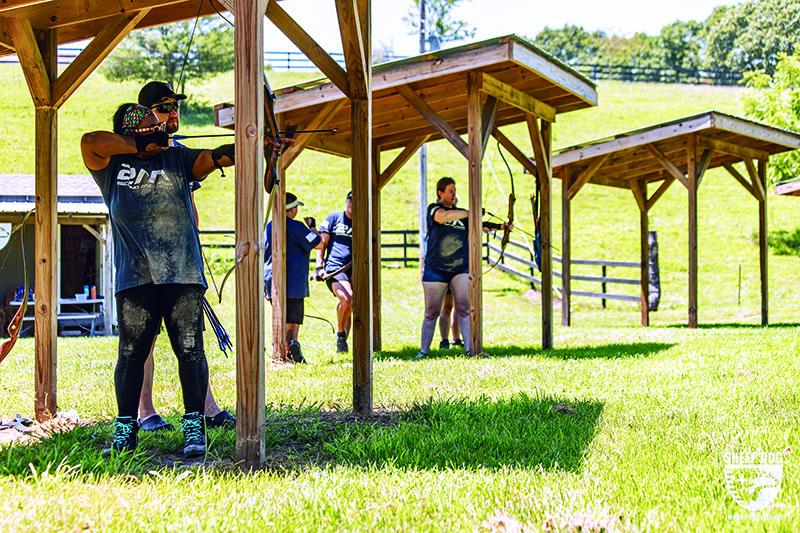
“Robert” (not his real name) had battled daily suicidal ideation for 13 years after retiring from the U.S. Army. The only thing keeping him alive was his young son. After years of struggle, Robert heard about Warrior PATHH and decided to attend. He couldn’t be more grateful that he did. By day five of the program, Robert’s continual nightmares and suicidal ideations disappeared. A short six months later, he became a peer-to-peer mentor with the Wounded Warrior Project and has found a new reason to live.
“Laura” (not her real name) was sexually assaulted at a young age and developed OCD as a result. As a teen, she was on 12 different medications. Searching for a way to resolve her own pain, Laura chose a career in law enforcement with a focus on child exploitation. Still, she often felt as though she were spiraling. At her lowest point, she would shower up to 40 times a day and throw away her clothes each night. In desperation, Laura found herself at Warrior PATHH. By day five of the program, she no longer felt the need to constantly shower. She bought new clothes and didn’t throw them away. Laura found a new way forward in life and now serves as a trained Warrior PATHH Guide.
Many more stories of transformation continue to be written today. As a registered 501(c)(3) organization, SDIA is run primarily by volunteers, many of them veterans and veteran spouses. Sheep Dogs possess an innate drive to help others, even after retirement. After participating in SDIA programs, a number of veterans and first responders have gone on to become staff or peer-to-peer mentors for the organization. Staying involved as a staff member at SDIA often furthers the staff member’s own healing journey as well as that of those they serve. “Guides get as much out of the courses as the students do,” said Jackson.
Bridgette West is one of four veteran spouses on staff at SDIA. She began volunteering at SDIA in 2017 and joined the full-time staff in 2019. Her husband, Scott, an Army veteran who serves as the Outdoor Adventures program director, lost both legs from an improvised explosive device in Iraq in 2005. He was in recovery at Walter Reed for an entire year. “He struggled more after coming home than he did when he was in the hospital,” Bridgette shared. “At Walter Reed, you’re still surrounded by people who know exactly what you’re going through. But when you go home, you lose all of that comradery.”
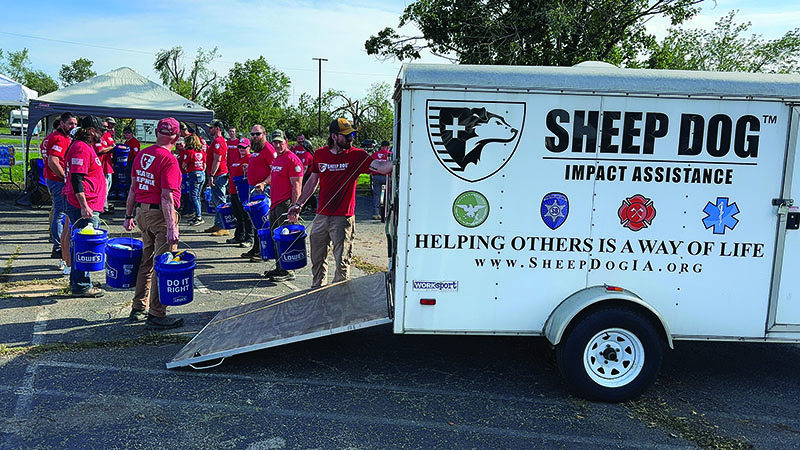
During Scott’s transition home, he became addicted to painkillers and eventually lost his first marriage as well as custody of his oldest son. Fortunately, his story didn’t continue in that direction. Scott found out about SDIA and joined a skydiving Outdoor Adventure, which began a profound healing journey for him. He eventually met and married Bridgette, and they have a son together who turns 7 years old this year. Bridgette is proud of how far Scott has come and feels very thankful for the role that SDIA played in his story. “Scott tells people that his life was saved twice—once at [Walter Reed], and once at SDIA.”
Bridgette’s role as the director of development and communications for SDIA means she is responsible for much of th organization’s fundraising activity. As a nonprofit, SDIA receives most of its funding through grants from private foundations. These grants, as well as donations from businesses and individuals, are the lifeline to continue helping the nation’s warriors heal and thrive after their service.
Countless lives have been changed through the SDIA programs, and the organization is committed to making their services available to whoever needs them. Warrior PATHH is always free of charge for military members and first responders, and Outdoor Adventures is free for sponsored military and first responders (those injured in the line of duty).
Since their inception in 2010, SDIA has led more than 360 disaster response missions, more than 235 Outdoor Adventures, and 50 Warrior PATHH courses. Outdoor Adventures and Warrior PATHH take place at the beautiful Heroes Ranch Training Facility, situated on 50-plus acres in Northwest Arkansas.
Sheep Dogs live a lifestyle of always putting others first, but they also deserve the opportunity to heal and grow so they can continue to lead lives that make a difference in their family, community and country.
Lance Nutt, Chris Jackson and Scott and Bridgette West have all personally experienced this. While it might sound counterintuitive, it has proved to be true: veterans can help more people in the long run if they come and heal first.
“Often, people hear about these programs and think, ‘Someone else needs that more than I do. I don’t want to take someone else’s spot,’’’ said Jackson. “But it’s OK to take time for yourself—you have to in order to fill up, so you can pour out.”
More information about the programs available through Sheep Dog Impact Assistance and how to apply can be found by visiting their website at www
.sheepdogia.org.
Author’s bio: Abigail Grysban is a freelance copywriter based in Kansas City, Mo. She writes on a wide range of topics, helping small businesses and nonprofit organizations to connect with and inspire their communities.




